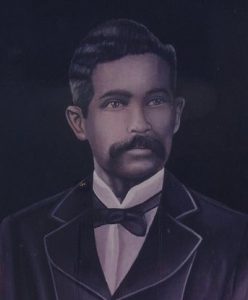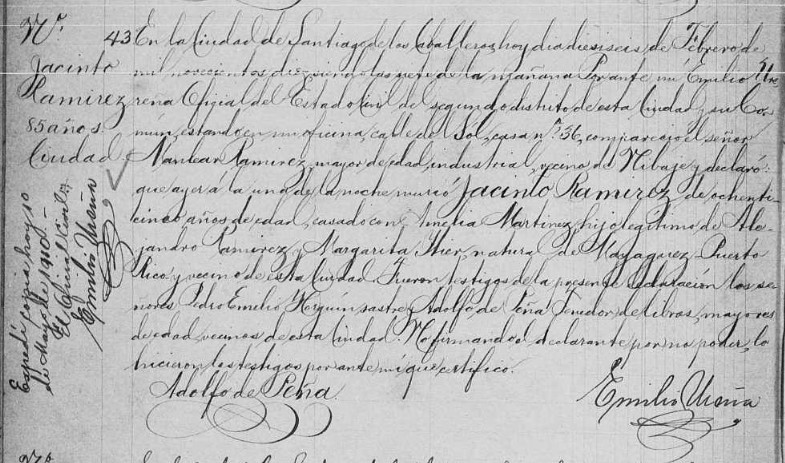A few months ago I posted that, in tracing my wife's ancestors, I had yet to find an ancestor who was born anywhere but in the Dominican Republic. This all changed within the last few days, thanks for a few detailed records, some very useful DNA matches, a detailed history of my mother-in-law’s hometown, and some luck! I now have three other places of birth for my wife’s ancestors, two within the Caribbean and one back to Europe – and not in Spain!
This started when I found the civil death record of my wife’s great-great-great-grandfather Jacinto Ramírez (1824–1910) of Santiago, Dominican Republic. This record not only listed Jacinto's parents but also his place of birth, which was quite a surprise:
The middle part of the record reads that Jacinto was the “legitimate son of Alejandro Ramírez and Margarita Hier, and a native of Mayaguez, Puerto Rico...”
Puerto Rico! This was the first place outside of the Dominican Republic that I'd found. A few initial searches for this family in Mayagüez came up empty, so I then went to my wife's DNA matches on Ancestry.com to see if there were any close Puerto Rican matches. While perhaps too many generations were involved for this to work out, I searched specifically for other descendants of Jacinto Ramírez.
[What] was going on with his father’s variable surnames?
There were four other matches, and one tree listed Jacinto's parents as Alexander Petain (born Paris, France) and Margarita Itier (born Martinique). If this was true, that would be two more places of birth, but what was going on with his father’s variable surnames?
I decided to do a series of Google searches. By searching “Jacinto Ramirez” and “Petain,” I was led to the website of the Historic Archives of Santiago, which had a text file of the 1976 book Santiago a Principios de Siglo (Santiago at the Beginning of the Century) by Pedro R. Batista C. The book itself is at the Harvard College Library, so I'll be sure to take a look at the print book soon. This work provided a very detailed biography on Jacinto Ramírez; among the facts gleaned were the following (this translation retains much of the flowery language in the original Spanish):
Don Jacinto Ramírez, an important figure in the eastern part of this area, and a foreigner with profound Dominican patriotism, … resided in this country around 1840. The legitimate son of the marriage of Alexander Petain, born in Paris; and Margarita Itier, born in Martinique, who lived in Puerto Rico, where Jacinto was born in 1824. But above all he was the paternal grandfather of the distinguished Santiago naturalist, educator and professor Ricardo Ramírez…
In Santiago he started a business relationship with the well-to-do businessman Pepe Murillo. Their business activities had them both travelling frequently between Samaná and Santiago, until because of the deterioration of the relationship between the Haitian and French governments, the French were seen poorly by the government of President Boyer, and Jacinto considered it necessary to conceal/disguise his [elegant] lineage/ancestry[,] changing his French name Petain to Ramírez, a very common one in Puerto Rico; and therefore, the first to come to mind during a difficult time. From there on he continued to call himself Ramírez with which he progressed in his business dealings and formed a family in Santiago...
The mystery of death seemed to interest him. Not only in regards to the life of the soul, but also in regards to the resting of the body in a peaceful abode. He built his tomb, a vault/mausoleum in the Cementerio Municipal[,] designed in such a way that alluded to the spiritual and religious ideal of the "Mansion of peace" and to the exclusion [in] so said place of the bad thoughts of the human heart, at the same time in life he also fabricated his own casket, made of steel.
But it so happened that one day, the morning following the killing of the brutal leader, President Ulises Hereaux, 26 July 1899, his body [was] recovered in the outskirts of Moca by General Perico Pepín and the Police Commissioner of Santiago Juan Bautista Paulino, and moved to the aforementioned city to the home of the former Minister of his Cabinet Don Juan Antonio Lora, [and] someone pointed out the convenience of requesting Don Jacinto's steel casket, for the body of the president. Don Jacinto handed it over, but immediately ordered his son Telésforo, the blacksmith[,] to import the materials with which to construct a new one, whose lid has the same number of stars as on the flag of his country of birth, in high relief.[1]
This was an extraordinary amount of information! This relationship was likely the source for my wife's DNA match, whose Ancestry tree said Jacinto's father was from France and his mother was from Martinique. But this information was only half right! Now, with more information, I found the death records of Jacinto’s three older sisters in Puerto Rico civil registrations. The relevant information each record gives:
Petrona Peltan Etier, died Maricao, Puerto Rico, 18 August 1893, age 95: “legitimate daughter of Alejo and Margarita, natives of Cabo Rojo”
Brigida Petan Ithier, died Mayagüez, Puerto Rico, 13 January 1891, age 80: “native of this place, widow of Gaspar Velez, native of Mayagüez, legitimate daughter of Don Alejo and of Doña Margarita Ithier, natives of this place and dead”
Maria Josefa Peltan Ithier, died Mayagüez 16 March 1899, age 80: “legitimate daughter of Alejo Peltan and of Margarita Ithier”
Also, the birth record of Petrona’s grandson, in 1900, referred to “Petrona Peltan Cabran, ..... [native] of Santo Domingo and died in Maricao.”
In these records, places, first names and surnames are getting translated from French to Spanish. While this last record may indicate that Jacinto's sister Petrona was born in Santo Domingo [the capital of Dominican Republic], if Santo Domingo is translated to French, this would be “Saint Domingue,” i.e. Haiti, the other country on the island of Hispaniola.[2]
After a series of searches, I found a documented tree of “knrosol” on Ancestry entitled “Saint Domingue Fully Documented!!!” which had these three identified sisters of Jacinto as the children of Alejo Beltran (a "Spanishized" variation of Petain/Peltan), born in France, and Margarita/Marguerite Ithier, born 19 October 1784 in Mirebalais, Haiti.
 This tree was a true godsend and had several scanned documents from eighteenth-century Haitian records, including this 1785 baptism of Marguerite. The record identifies both Marguerite’s parents as “quarterone libre,” which was the French way to indicate they were free (not enslaved) people of color who were one quarter African and three quarters French. Indeed, this tree identifies numerous earlier ancestors in Haiti and in specific places in France and indicates that Marguerite’s parents – Charles Ithier and Marguerite Corporan – both had African maternal grandmothers.
This tree was a true godsend and had several scanned documents from eighteenth-century Haitian records, including this 1785 baptism of Marguerite. The record identifies both Marguerite’s parents as “quarterone libre,” which was the French way to indicate they were free (not enslaved) people of color who were one quarter African and three quarters French. Indeed, this tree identifies numerous earlier ancestors in Haiti and in specific places in France and indicates that Marguerite’s parents – Charles Ithier and Marguerite Corporan – both had African maternal grandmothers.
This record identifies both Marguerite’s parents as “quarterone libre,” which was the French way to indicate they were free (not enslaved) people of color who were one quarter African and three quarters French.
I'm just scratching the surface at this very interesting part of my wife’s ancestry. Likely Jacinto Peltan, born to a Haitian couple who moved to Puerto Rico (probably in the midst of the Haitian Revolution), went back to the island of his mother’s birth, but on the Spanish side, i.e., the Dominican Republic. While the 1976 history indicates issues between Haiti and Dominican Republic prompted him to change his French surname to Ramírez, this also may have been the reasoning as well to change his Haitian background to that of Martinique.
When my family travels to Dominican Republic this summer for a family reunion, we will set aside some time to do some research in Santiago, and we now have several other places to research our ancestors: in Puerto Rico, Haiti, and France!
Notes
[1] Stars is in plural here, although the flag of Puerto Rico (Jacinto’s birthplace) has only one star.
[2] As Petrona was born around 1798, if Saint Domingue is her correct birthplace, then her father Alexander/Alejo Peltan likely emigrated first from France to Haiti, where he met his wife, before the whole family moved to Puerto Rico.
Share this:

About Christopher C. Child
Chris Child has worked for various departments at American Ancestors since 1997 and became a full-time employee in July 2003. He has been a member of American Ancestors since the age of eleven. He has written several articles in American Ancestors, The New England Historical and Genealogical Register, and The Mayflower Descendant. He is the co-editor of The Ancestry of Catherine Middleton (American Ancestors, 2011), co-author of The Descendants of Judge John Lowell of Newburyport, Massachusetts (Newbury Street Press, 2011) and Ancestors and Descendants of George Rufus and Alice Nelson Pratt (Newbury Street Press, 2013), and author of The Nelson Family of Rowley, Massachusetts (Newbury Street Press, 2014). Chris holds a B.A. in history from Drew University in Madison, New Jersey. Areas of expertise: Southern New England, especially Connecticut; New York; ancestry of notable figures, especially presidents; genetics and genealogy; African-American and Native-American genealogy, 19th and 20th Century research, westward migrations out of New England, and applying to hereditary societies. Chris has lectured on these topics and edits the genetics and genealogy column for American Ancestors.View all posts by Christopher C. Child →

